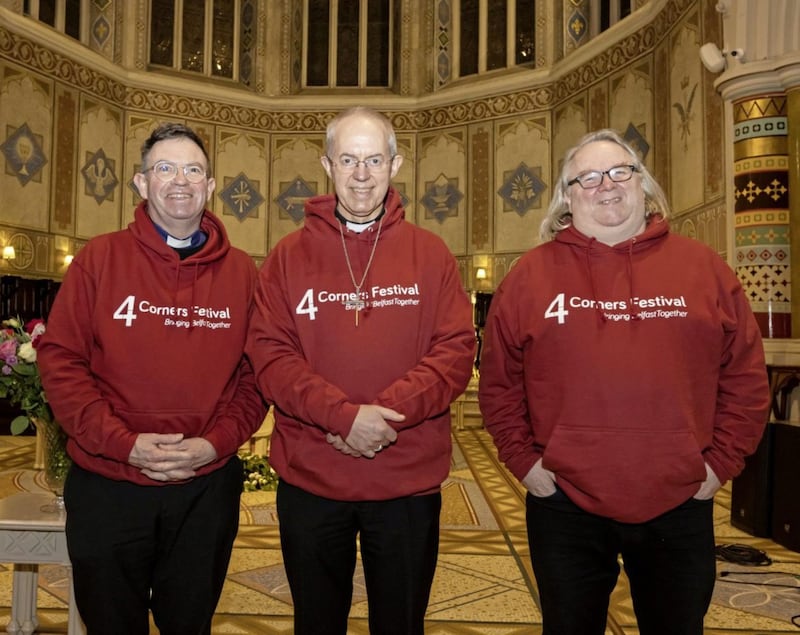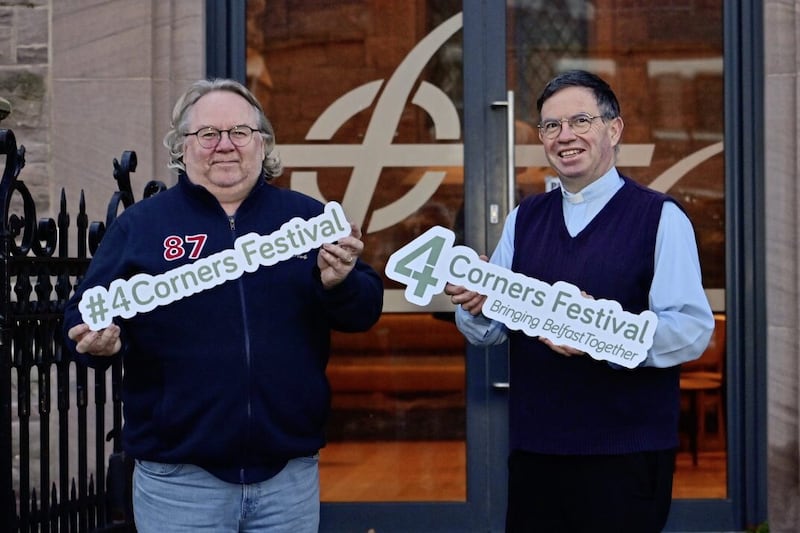IF there is any community who has walked the long and painful journey from enemy to friend, and made the hard choices of forgiveness, repentance and reconciliation, it is here on the island of Ireland.
There remain, of course, huge challenges but the people of Northern Ireland have begun hesitantly to walk together. With enormous courage you offer us this gift of witness to the God who can turn any dead end into a turning point.
Conflict happens at all levels of society, from the individual, to families, to communities, to countries, to the whole world.
It is easy to feel hopeless in the face of these massive problems. Yet you have faced the same and the 4 Corners Festival speaks of risk taking and sacrifice making.
Northern Ireland can testify to change, can share success and failure, setback and advance, and in so doing can both advance itself and enable others to travel along with it.
But where do we start with such sharing? I suggest first with who we are - with identity. Identity is complicated, in individual or community. You know that.
When I worked as Dean of Liverpool Cathedral, the first question I was asked was, "Are you red or blue?" Are you a supporter of Liverpool or Everton? When one asked the question back the answer would be "X, my family has always been X".
So often our identities set us apart, and we define ourselves in contrast to others.
The 20th century showed the danger of identity defined by race - Aryan, or not Jewish or Slav, Romany, gay, or ability, not with a disability, not with Down's and so on.
What Jesus does is give us a new identity. It is who we are really called to be. It overcomes the identities we create, seek or have imposed on us by heredity, genetics, history or mere sin.
Peter writes: "But you are a chosen people, a royal priesthood, a holy nation, God's special possession, that you may declare the praises of him who called you out of darkness into his wonderful light.
"Once you were not a people, but now you are God's people; once you had not received mercy, but now you have received mercy." (1 Peter 2:9-11).
Whenever we are tempted to draw lines between 'us' and 'them', Jesus can always also be found on the other side. God calls us together into community - the people Peter writes to are living in Asia Minor, likely oppressed, likely marginalised, with little social status.
And Peter teaches them how to look at themselves and others - not through the lenses of power, status, race, heritage, nationality or wealth but through the loving eyes of God.
So maybe that's where we can start together - by reaffirming where we find our identity, as beloved children of God, called to 'declare the praises of him who called us out of darkness and into his marvellous light'.
We still have an identity, but it is built on the rock of God's all seeing wisdom, not the sands of our shifting fears and desires. It is identity that opens the door to hope through the myriad identities of those around us, whom we learn to love.
So, first, seek identity in gift, grace and positivity, not in negation and enemies.
And what does that look like in practice when it comes to building communities that love across difference, that transform violence into understanding?
It means embracing complexity - that is my second principle to share. No conflict is simple, no peace building happens without setbacks, failures, risks and sacrifice. It is always complicated.
Third, be patient and persistent. Peace and forgiveness are the work of decades, generations of fitful improvement. They will come, resilience matters, but there are no quick fixes.
And what are the habits of peace building? The reconciliation team, based at Lambeth Palace, have written something called The Difference Course.
It is a five-session course, lasting about an hour-and-a-half each session, which looks at different aspects of conflict and talks about three 'habits':
1. Be curious - developing a truly empathetic worldview perspective of our competitors, our challengers, our adversaries, our enemies. Curiosity opens us to their humanity. It risks us seeing them not as a category, but as people. It causes us to seek their identity.
2. The need to be present - the ability to encounter and listen to those who might mean us harm. Presence says stick with it, listen and experience what they feel. Don't circle the wagons and seek a safe place excluding all who do not agree with you. That risks understanding that they may not be entirely wrong.
3. The ability to reimagine - making change possible together, and with that to deliver sustainable peace. Reimagining conflict, at any level from family to international, so as to see how to disagree well takes a whole community. It will always lead to sacrifice, and to abundant and mutual flourishing life.
The 4 Corners Festival is very much these habits in action - calling people to new places, to meet new people and hear new perspectives and to respond with presence and curiosity.

Coventry Cathedral has one of my favourite pictures, the Stalingrad Madonna. It was drawn on paper in charcoal on Christmas Day 1942, 80 years ago, by a German medical officer under siege from the advancing Russian armies near Stalingrad.
It shows Mary huddled against the terrible cold, holding Jesus, sheltered, to her cheek. The Christ child shivers in darkness, threatened by death, surrounded by hatred and conflict. And yet around Mary are the words "Licht, Leben, Liebe": Light, life, love.
This fragile child is God's answer to the power of war, to the darkness of sin, to the threat of death. This baby is the cornerstone of peace, the foundation of reconciliation, the promise of hope and life.
In the infant Jesus, the power and presence of God is truly revealed. In a world where we cry out, 'Have mercy, we want peace', the Christ-child responds today, 'Have hope. Here is peace'.
In Colombia in 2010, an advertising agency came up with a unique Christmas campaign. Not the sort we normally see, but one to bring home guerrilla fighters, living in the jungle and separated from their families for many years.
They decorated trees with Christmas lights and added a message: "If Christmas can come to the jungle, you can come home. Demobilise. At Christmas, everything is possible."
If God can come to us, we can always turn to Him. He can bring peace out of violence. He offers light amid the darkness.
"Blessed are the peacemakers," said Jesus, "for they will be called the children of God." As the children of God - which is all of us, no matter who we are or where we're from - our calling is to pursue the peace of God who reconciles us to ourselves, to him, to one another and to our world.
More about this year's 4 Corners Festival, including photographs and recordings of the events, can be found at 4cornersfestival.com.








